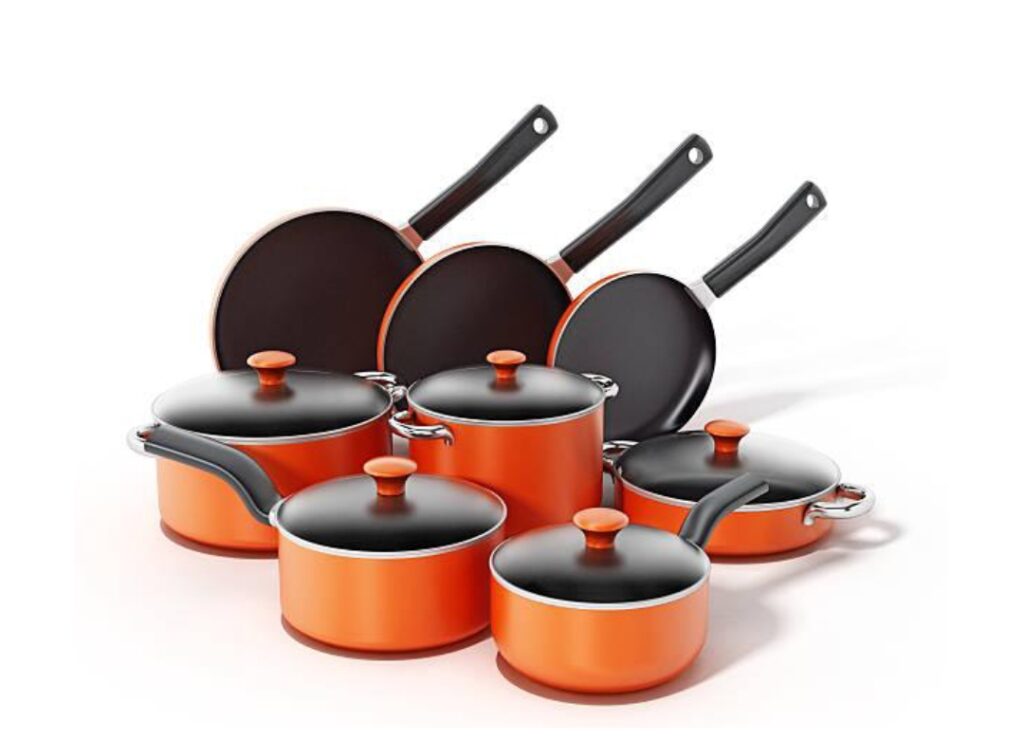orange cooking and frying pans set isolated on white
Anodized aluminum is a popular material used in various industries due to its durability, corrosion resistance, and aesthetic appeal. This metal’s unique properties make it a favorite choice for manufacturers and consumers. However, with its widespread use, many people wonder about the safety of anodised aluminum. Most concerns often arise regarding its potential health effects and whether it’s safe for everyday use. Thus, this article explores what anodized aluminum is, delves into its safety aspects, and examines some common applications. Let’s get right into it.
What Is Anodized Aluminum?

different colored anodized aluminum metal parts
Anodized aluminum is a type of aluminum that has undergone an electrochemical process to form a protective, corrosion-resistant, and durable oxide layer on its surface. This process involves immersing the aluminum in an acid electrolyte bath and passing an electric current through the medium. The aluminum acts as the anode (the positively charged electrode) in this setup, hence the term “anodizing.” The anodizing process enhances the metal’s natural properties and makes it more versatile for various applications.
To clearly understand anodized aluminum, let’s delve into the process.
Aluminum Anodizing Process
The anodizing process consists of several steps. Check them below:
Cleaning and Preparation
Before anodizing, manufacturers thoroughly clean aluminum workpieces to remove all surface contaminants such as grease, oil, and dirt. This ensures that the anodizing process results in a uniform finish.
Anodizing
The cleaned aluminum is then immersed in an acid electrolyte bath, typically consisting of sulfuric acid. Afterward, the operator will apply an electric current. During this stage, oxygen ions are released from the electrolyte and combine with the aluminum atoms on the surface of the metal. This reaction forms a layer of aluminum oxide, which is much harder and more durable than raw aluminum.
Coloring (Optional)
One of the advantages of anodizing is the ability to add color to the aluminum. By introducing various dyes during the anodizing process, manufacturers can use various anodized aluminum colors, enhancing the aesthetic appeal of the final product. Alternatively, metal fabricators use electrolytic coloring, when metal salts get deposited in the pores to create color.
Sealing
After anodizing, the anodized aluminum is often sealed in boiling water or steam to close the pores. This enhances its corrosion resistance and locks in any colors applied during the coloring stage. This step converts the aluminum oxide into a more stable form called boehmite. Another method involves sealing the pores using chemical solutions at room temperature, which can sometimes offer better results depending on the application.
Is Anodized Aluminum Safe?

a pot and two mugs with handles, aluminum alloy pans, food in nature concept
Anodized aluminum is generally considered safe for a wide range of applications, including those involving food and skin contact. The anodizing process creates a non-reactive surface that prevents the aluminum underneath from leaching into food or reacting with other substances. This makes anodized aluminum a popular choice in cookware, medical devices, and other consumer products where safety is paramount.
Why Is Anodized Aluminum Considered Safe?
Here are the reasons anodized aluminum is considered safe:
Non-Reactive Surface
The anodized layer, composed of aluminum oxide, is chemically stable and non-reactive. Unlike raw aluminum, which can react with acidic or alkaline foods, the anodized aluminum sheet does not interact with food or beverages. This makes it ideal for cookware, food storage containers, and kitchen utensils.
The non-reactive nature of anodized aluminum ensures no alteration in the taste or quality of the food. The oxide layer is also non-porous, which means it doesn’t absorb flavors or odors, keeping your food fresh and pure.
Durability and Integrity
Anodized aluminum’s rugged and durable surface resists scratches and wear, ensuring the protective oxide layer remains intact even with regular use. This integrity means the base aluminum is less likely to be exposed, further enhancing safety.
The durability of anodized aluminum also translates to a longer lifespan for products, reducing the frequency of replacements and ensuring consistent performance. This makes it an economically and environmentally favorable choice for many consumers and industries.
Heat Resistance
The anodized layer can withstand high temperatures without degrading. This heat resistance is crucial for cookware, ensuring the protective layer remains intact under intense cooking conditions. Anodized aluminum can be used safely in stovetop and oven applications, making it a versatile option in the kitchen. It also means that anodized aluminum products are less likely to warp or degrade over time, maintaining their shape and functionality.
Corrosion Resistance
Anodized aluminum’s resistance to corrosion ensures that it does not break down or leach harmful substances over time. This property remains critical in applications like water bottles and other containers where prolonged contact with liquids occurs.
The corrosion resistance of anodized aluminum also extends to outdoor applications, where it can withstand harsh weather conditions without deteriorating. This makes it suitable for outdoor furniture, architectural components, and marine equipment.
Biocompatibility
Anodized aluminum is biocompatible, meaning it does not cause adverse reactions when in contact with human tissue. This property suits medical devices, implants, and surgical instruments. The biocompatibility of anodized aluminum ensures that manufacturers can safely use it in applications that require direct contact with the body, such as orthopedic implants and dental tools. This makes it a preferred material in the medical industry, where safety and reliability are paramount.
Environmental Impact
The anodizing process is environmentally friendly, using less harmful chemicals compared to other metal finishing processes. Furthermore, aluminum is a recyclable material, and anodized aluminum products can often be recycled at the end of their lifespan. This makes anodized aluminum a sustainable choice for consumers and industries looking to reduce their environmental footprint.
Applications of Anodized Aluminum

colorful anodized aluminum custom parts
Anodized aluminum finds applications in various industries due to its unique properties. Its durability, resistance to corrosion, and aesthetic versatility make it a popular choice in different fields.
Below are the various applications of anodized aluminum:
Consumer Products
Many pots, pans, and baking sheets are fabricated from anodized aluminum. The non-reactive surface prevents food from sticking and ensures that it does not alter the taste of food or leech harmful substances. The anodized aluminum cookware also remains safe to use even at high temperatures. It is also often easier to clean and maintain than other materials, making it ideal for kitchen utensils and appliances.
Many electronic devices use anodized aluminum for their casings. This material provides a sleek, modern appearance and offers excellent heat dissipation. The durability of anodized aluminum protects electronic components from damage due to impacts and environmental factors.
Sporting Goods
Anodized aluminum is used in bicycles, camping gear, and other outdoor equipment. Its light weight and strength make it perfect for products that need to withstand rough conditions while being easy to carry. The corrosion resistance ensures longevity, even when exposed to the elements.
Automotive and Aerospace
Anodized aluminum finds application in both automotive and aerospace industries for components that require a combination of light weight and strength. Examples include body panels, trim, and interior fittings. Anodized aluminum’s corrosion resistance and durability contribute to the overall safety and longevity of vehicles and aircraft.
Anodized aluminum heat sinks and radiators are vital in managing thermal performance in both industries. The material’s excellent thermal conductivity and ability to withstand high temperatures make it ideal for these applications.
Medical and Healthcare
The biocompatibility of anodized aluminum makes it suitable for medical devices and surgical instruments. Its non-reactive surface ensures that it can be safely used in contact with human tissue. The durability and ease of sterilization add to its advantages in medical applications.
Anodized aluminum is also used in the production of prosthetics and implants. Its lightweight, strength, and biocompatibility make it an ideal material for these applications. The anodized surface provides a non-reactive barrier that minimizes the risk of adverse reactions within the body.
Industrial Applications
In industrial settings, anodized aluminum applies to parts and components that need to withstand harsh conditions. Its resistance to wear and corrosion ensures that machinery and equipment perform reliably over time. The material’s strength and light weight also contribute to the efficiency and safety of industrial operations.
Anodized aluminum storage tanks and containers are also used in food, beverage, pharmaceutical, and chemical industries. The non-reactive surface prevents contamination, while the durability ensures that these containers can handle the rigors of industrial environments.
Marine Applications
The resistance to corrosion, especially in saltwater environments, makes anodized aluminum a popular choice for boating equipment. Examples include masts, railings, and fittings. The material’s light weight contributes to the overall efficiency and performance of marine vessels. Further, marine manufacturers use anodized aluminum in underwater equipment such as diving gear and underwater cameras. Its durability and resistance to corrosion ensure reliable performance in challenging conditions.
Conclusion
Anodized aluminum stands out as a versatile and reliable material across various industries. Its durability, resistance to corrosion, and aesthetic appeal make it a preferred choice for applications. Anodized aluminum’s non-reactive surface ensures it remains safe for food contact, medical use, and everyday consumer products. Whether you choose cookware, medical devices, or consumer goods, anodized aluminum offers a safe and robust option. That said, you can consider the benefits of anodized aluminum for your next project to ensure functionality and aesthetic appeal.
At Zintilon, you can explore the potential of anodized aluminum for your next project. From custom finishes to precision engineering, our expert team ensures quality and innovation every step of the way. Contact us today to discover how anodized aluminum can elevate your products and designs.







